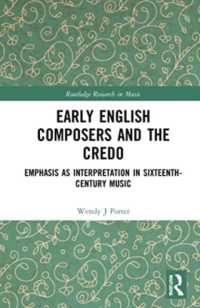- ホーム
- > 洋書
- > 英文書
- > History / World
Full Description
This book examines the critical role played by colonial peripheries, specifically British India, in shaping the development of zoology and other disciplines emerging from 19th-century natural history. Through an analysis of publications such as the monumental Fauna of British India series (1888-1949), it explores how zoology became a site of contestation between European metropolitan centres and colonial territories. While taxonomy and comparative anatomy dominated scientific endeavours in Europe, colonial naturalists-primarily European expatriates-engaged in a localized form of natural history and taxonomy that significantly influenced the field. Central to this narrative is the figure of the 'translocate,' a term introduced to describe Europeans who lived and worked extensively in colonial contexts. These intermediaries bridged colonial and metropolitan scientific communities, asserting dual authority: they claimed a superior understanding of the local environment while navigating and often dismissing indigenous knowledge systems within an asymmetrical power dynamic. By doing so, it repositions the colonial periphery as a critical space in the global development of zoological knowledge, highlighting the complex interplay of authority, power, and knowledge production during the colonial era.





